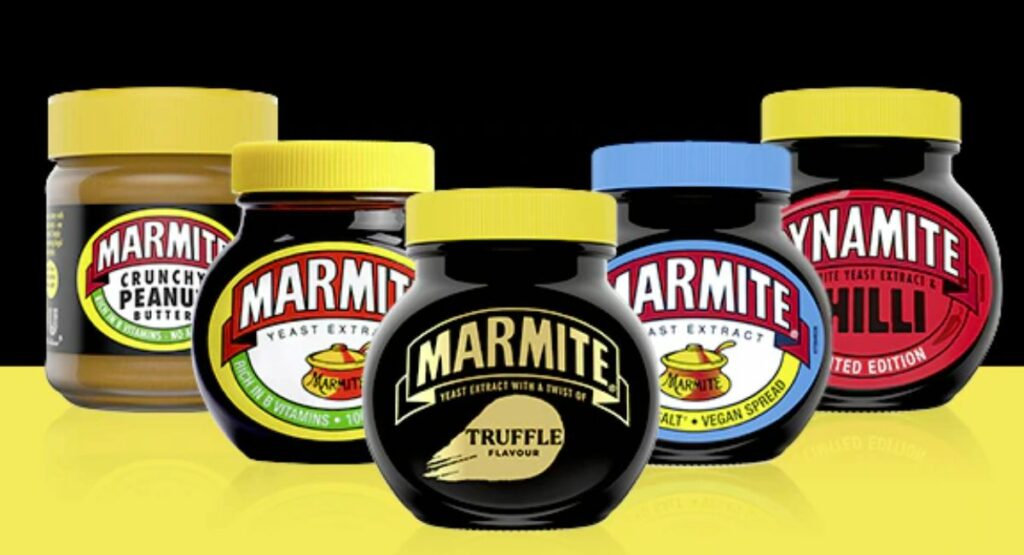Marmite, a distinctive and polarizing spread, has long been a staple in many households, known for its intense flavour and unique texture. As the popularity of this yeast extract continues to grow, so does the curiosity surrounding its suitability for specific dietary restrictions. One of the most frequently asked questions is, “Is Marmite Halal?” For individuals adhering to Islamic dietary laws, ensuring the halal status of food products is of utmost importance. In this blog post, we delve into the realm of Marmite, examining its ingredients, production process, and the considerations that determine its halal compatibility. Join us as we explore this intriguing topic and shed light on whether Marmite can be enjoyed by those following a halal lifestyle.
What Is Marmite?

Marmite, an iconic food spread, has etched its name in culinary history with its distinct taste and devoted following. This dark, savoury delight originated in the United Kingdom and has since gained popularity worldwide. But what exactly is Marmite?
Marmite is a yeast extract spread made from concentrated brewer’s yeast. Its recipe dates back to the late 19th century when German scientist Justus von Liebig discovered a way to concentrate yeast for use as a food supplement. The invention caught the attention of a British company named Marmite Food Extract Company, which then refined the process to create the beloved Marmite spread we know today.
The production of Marmite involves fermenting yeast, typically a byproduct of beer brewing, to create a concentrated paste. This paste combines with various seasonings, including salt, spices, and vegetable extracts, to achieve its unique flavour profile. The resulting spread boasts a rich umami taste that has sparked adoration and controversy among food enthusiasts.
Marmite’s distinctive flavour can be described as intensely savoury, with a hint of bitterness. It has a thick, sticky consistency, making it ideal for spreading on bread, toast, or crackers. Some enthusiasts even enjoy incorporating Marmite into recipes, using it as a secret ingredient to enhance the flavour of stews, gravies, or even baked goods.
Despite its robust taste and loyal fan base, Marmite remains a polarizing spread. Its strong flavour profile has divided opinions, earning it the catchphrase, “You either love it or hate it.” However, Marmite’s undeniable uniqueness and cultural significance have made it an enduring symbol of British cuisine.
Whether you’re a Marmite enthusiast or a curious culinary explorer, this yeast extract spread continues to captivate taste buds and spark intriguing debates. So, if you’re ready to embark on a flavour adventure, grab a jar of Marmite, spread it on your favourite bread, and let its distinct taste take you on a journey unlike any other.
Ingredients Of Marmite

The ingredients of Marmite typically include:
- Yeast Extract: The primary component of Marmite, derived from concentrated brewer’s yeast. It undergoes a fermentation process to develop a distinctive flavour profile.
- Salt: Used to enhance the taste and act as a natural preservative.
- Vegetable Extracts: Various vegetable extracts are added to provide additional flavour and depth to the spread.
- Niacin (Vitamin B3): A water-soluble vitamin that plays a vital role in energy production and metabolism.
- Thiamin (Vitamin B1): Another water-soluble vitamin that supports the nervous system and helps convert food into energy.
- Riboflavin (Vitamin B2): An essential vitamin that aids in the production of red blood cells and supports growth and overall health.
- Folic Acid: Also known as Vitamin B9, folic acid is crucial for cell growth and the production of DNA.
- Vitamin B12: A key nutrient necessary for the formation of red blood cells and proper nerve function.
- Spice Extracts: Various spice extracts are used to contribute to the unique and complex flavour profile of Marmite.
It is important to note that the specific formulation of Marmite may vary slightly depending on the country of production and any regional regulations or preferences. It is always advisable to check the product label or contact the manufacturer for the most accurate and up-to-date ingredient information, especially if you have specific dietary concerns or restrictions.
How Is It Made? The Process Of Marmite
The production process of Marmite involves several key steps to creating the iconic yeast extract spread. Here is a detailed explanation of how Marmite is made:
- Yeast Cultivation: The process begins with the cultivation of yeast, typically derived as a byproduct from beer brewing or other fermentation processes. Yeast, a microscopic fungus, serves as the primary ingredient in Marmite. It is rich in proteins, vitamins, and minerals.
- Fermentation: The cultivated yeast is then subjected to a controlled fermentation process. The yeast is mixed with water and other nutrients to create an ideal environment for growth. During fermentation, the yeast consumes sugars and converts them into alcohol and carbon dioxide. This process takes place in large vessels called fermenters.
- Separation: Once the fermentation process is complete, the mixture undergoes separation to remove the spent yeast cells and other impurities. The separation can be achieved through various methods such as filtration or centrifugation. This step ensures that only the desired yeast extract is retained for further processing.
- Concentration: The extracted yeast is then concentrated to form a thick paste. This process involves removing the excess water from the yeast extract, resulting in a concentrated form that gives Marmite its intense flavour. The concentration can be achieved through techniques like evaporation or vacuum drying.
- Seasoning: After concentration, the yeast extract is combined with various seasonings and flavourings to achieve the distinct taste of Marmite. Salt is a significant ingredient that enhances the flavour and acts as a natural preservative. Additionally, vegetable extracts and spice extracts are added to contribute to the complex flavour profile.
- Mixing and Blending: The concentrated yeast extract and seasonings are thoroughly mixed and blended to ensure a homogenous distribution of flavours. This step ensures that every jar of Marmite has a consistent taste and texture.
- Packaging: Once the mixing and blending process is complete, the Marmite spread is ready for packaging. It is carefully filled into jars or containers, which are sealed to maintain freshness and prevent any contamination.
- Quality Control: Throughout the production process, strict quality control measures are implemented to ensure that the final product meets the required standards. This includes testing for flavour, consistency, and adherence to safety and regulatory guidelines.
It is worth noting that the specific manufacturing techniques and variations in ingredients may differ depending on the country of production and regional preferences. Manufacturers may have their proprietary methods to create their unique Marmite recipes. However, the general steps outlined above provide a comprehensive overview of the typical process involved in making Marmite, a beloved and distinctive yeast extract spread enjoyed by many.
Is Yeast Extract Halal Or Haram?

Yeast extract, as a general ingredient, is considered halal. Halal refers to what is permissible or lawful in Islamic dietary guidelines. Yeast extract is derived from yeast, a type of fungus, which is categorized as a microorganism rather than an animal or meat product.
Islamic dietary laws primarily focus on the permissibility of consuming meat and meat products, ensuring that they adhere to specific requirements, such as the animal being slaughtered in a prescribed manner (halal slaughter). However, when it comes to non-meat products like yeast extract, the general consensus among Islamic scholars is that they are permissible for consumption and therefore considered halal.
Yeast extract is commonly used as a flavouring agent and nutritional supplement in various food products. It is obtained through the fermentation process of yeast, typically a byproduct of beer brewing or other fermentation processes. During fermentation, yeast cells break down, and the resulting extract is separated and concentrated to create yeast extract.
Since yeast extract is not derived from animals or meat sources, it does not fall under the category of haram (forbidden) ingredients in Islamic dietary laws. However, it is always recommended for individuals adhere to halal guidelines to ensure that the yeast extract they consume is free from any alcohol content, as alcohol is considered haram.
It is important to note that while yeast extract itself is considered halal, the final halal status of a product containing yeast extract depends on the other ingredients used in its formulation. If a food product contains any haram ingredients or additives, it may render the overall product haram. Therefore, it is crucial to read the ingredient labels carefully and look for appropriate halal certification symbols to ensure the complete halal compliance of a product.
As with any dietary concern, it is advisable for individuals seeking halal assurance to consult with reliable Islamic scholars or certification organizations to obtain accurate and specific guidance regarding the halal status of yeast extract or any other food ingredient.
Is Marmite Halal?
Determining the halal status of Marmite requires a closer examination of its ingredients and production process. Marmite itself does not contain any haram (forbidden) ingredients such as meat, alcohol, or animal-derived substances. However, the key consideration lies in the presence of yeast extract, which is a crucial component of Marmite.
Yeast extract, derived from the fermentation of yeast, is generally considered halal as it is obtained from a microorganism rather than an animal source. While yeast is a living organism, Islamic dietary laws do not prohibit the consumption of microorganisms.
However, it is important to note that there are differing opinions among Islamic scholars regarding the permissibility of consuming yeast extract due to its fermentation process. Some scholars argue that the transformation of yeast during fermentation might resemble the process of alcohol production, which is considered haram.
Therefore, individuals who strictly adhere to the more conservative interpretations of Islamic dietary laws may choose to avoid products containing yeast extract or seek specific guidance from reliable Islamic scholars or certification organizations. They may recommend alternative spreads or similar products that are explicitly certified as halal.
Ultimately, the halal status of Marmite may vary depending on individual interpretations and personal dietary practices. To ensure halal compliance, individuals should carefully read the ingredient labels and seek products that have obtained reliable halal certification from reputable sources.
Explore our detailed guides to ensure you’re well-informed about the halal compliance of various food spreads, making it easier to maintain your dietary preferences.
Is Margarine Halal: Discover the truth about the halal status of margarine in this informative article. Uncover the key facts and considerations surrounding this popular spread in the halal diet.
Is Vegemite Haram: Delve into the debate surrounding Vegemite’s halal status. This article explores the ingredients and processes behind this iconic spread, helping you make an informed decision about its compatibility with your halal dietary choices.
Conclusion
In conclusion, Marmite is considered halal and can be enjoyed by individuals following a halal diet. Marmite is a food spread made from brewer’s yeast extract, which does not involve the use of any haram (forbidden) ingredients. It does not contain any animal-derived substances or alcohol, both of which are prohibited in halal dietary practices. The yeast used in Marmite is a microorganism and not derived from animal sources, making it permissible for consumption by Muslims.
It’s important to note that halal certification can vary by region and manufacturer, so it’s advisable to look for specific halal certification labels on the Marmite packaging. By doing so, individuals can ensure that the Marmite they consume meets the halal standards recognized by reputable halal certification authorities.






